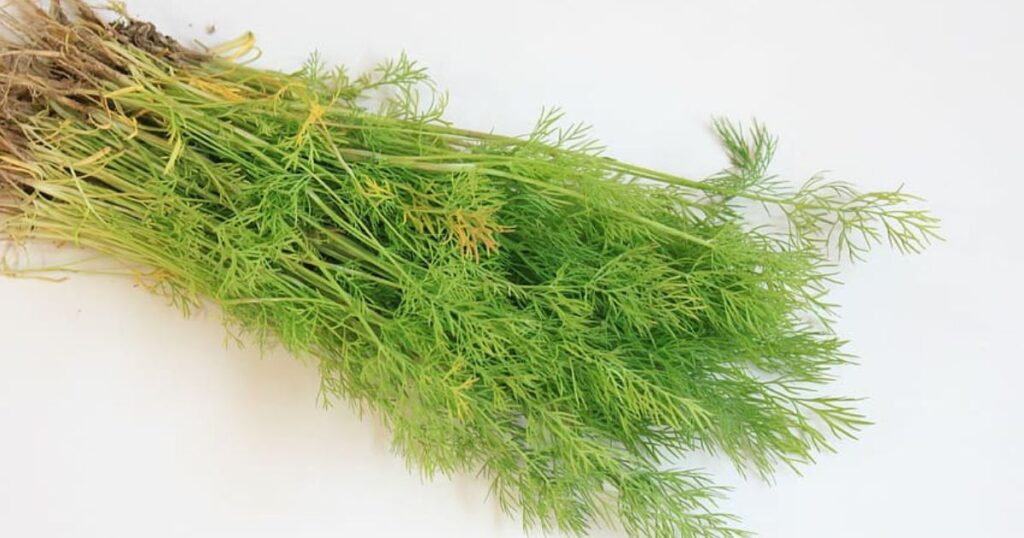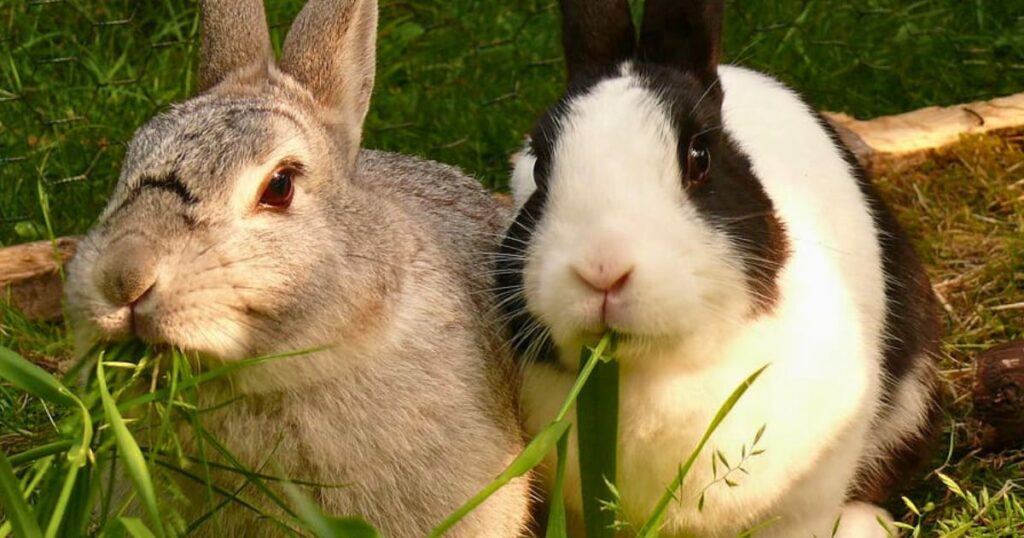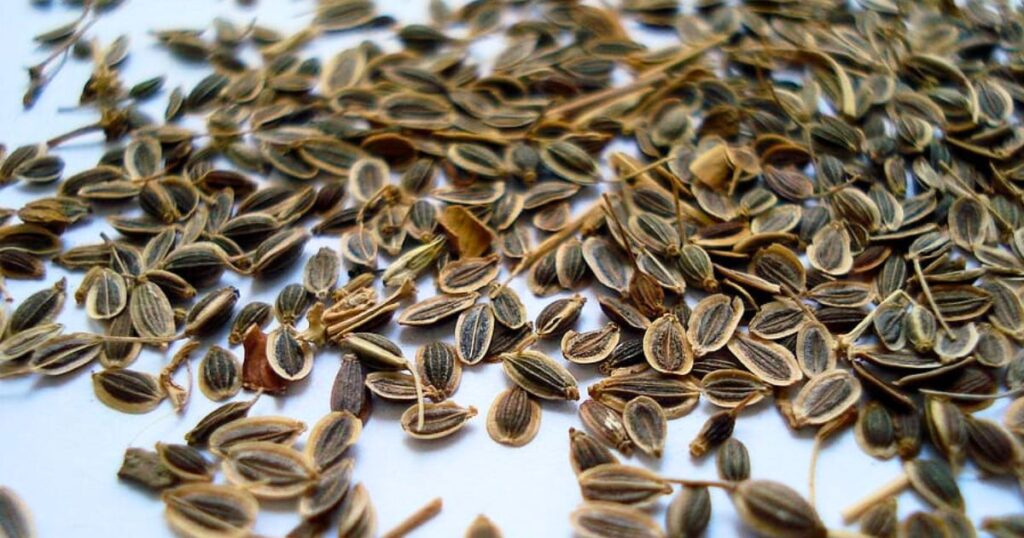
Dill, also known as Anethum graveolens, is an aromatic herb that is widely used in cooking and has a distinct flavor and fragrance.
It is native to the Mediterranean region and is a member of the parsley family. Dill is known for its feathery, fern-like leaves and small yellow flowers that bloom in clusters.
Now, you might be wondering if rabbits can eat dill too.
Well, the good news is that rabbits can indeed enjoy dill! Rabbits are herbivores, which means they primarily eat plants, and dill is one of the many plant-based foods they can munch on. However, there are some things to keep in mind when it comes to feeding dill to rabbits to ensure their safety and health.
Now, let’s explore further to learn about the benefits and considerations of feeding dill to our furry friends.
Table of Contents
Can Rabbits Eat Dill?
Rabbits can indeed eat dill. The dill plant, including its leaves, stems, and flowers, are safe and nutritious for rabbits.
Dill is a herb that offers various benefits to rabbits. It is a good source of vitamins A and C, as well as minerals like calcium and iron.
However, overfeeding dill can be harmful to your pet.
Rabbits have complex digestive systems; excess fiber of dill can upset the tummy, resulting in diarrhea, stomach ache, loss of appetite, and so on.
If you are feeding dill to your rabbits for the first time:
- Serve only a small for the first time
- See if your rabbit is eating them or not
- Closely monitor your pet for about 24 hours
- Look for behavioral changes, e.g., digestive problems, loss of appetite or bowel problems.
Take your rabbit to a vet if they show any negative symptoms; otherwise you can occasionally serve dill to your rabbits.
If you are still doubtful, consult your vet.
Can Rabbits Eat Dill Stems?
Dill is an herb that’s often used in cooking to add flavor to dishes.
While rabbits can eat some parts of dill, like the leaves, the stems are a bit tougher for them to chew on. They might find it difficult to digest the stems properly.
Now, it’s not that the stems are harmful to rabbits, but they can cause some tummy troubles if eaten in large amounts. Rabbits have sensitive stomachs, and too many tough stems might give them a bit of a tummy ache.
So, it’s best to be on the safe side and not give rabbits too many dill stems.
If you have a pet rabbit, you can offer them small amounts of dill leaves instead. They will enjoy the flavor, and it won’t cause any harm to their delicate digestive system.
How Much Dill Can Rabbits Eat?
When it comes to feeding rabbits dill, it’s important to remember that moderation is key. Rabbits can enjoy dill, but giving them small amounts is best.
Imagine you have a plate of your favorite cookies. You know they taste really yummy, but if you eat too many all at once, it might upset your tummy.
The same goes for rabbits and dill!
You can offer your bunny a small piece of dill, maybe a couple of leaves, as a treat once in a while. This way, they can enjoy the tasty flavor without any tummy troubles.
Rabbits have special diets that include hay, fresh leafy greens, and some rabbit pellets.
These foods give them all the important nutrients they need to stay healthy and happy.
Also Read: Can Rabbits Eat Rosemary? [Serving, Risks & More]
Benefits of Eating Dill for Rabbits

Dill is not only delicious but also a healthy treat option for rabbits. They are a rich source of various vitamins and minerals which can benefit your pet.
A typical serving of dill (approx 4 grams) contains:
- Calories: 3
- Carbohydrates: 0.6 grams
- Fiber: 0.3 grams
- Protein: 0.2 grams
- Fat: 0.1 grams
Other health benefits of dill may include:
Hydration: Dill has a high water content, which can help keep rabbits hydrated, especially during warm weather.
Digestive Health: Dill contains dietary fiber, which can support healthy digestion in rabbits and prevent issues like constipation.
Antioxidant Properties: Dill is rich in antioxidants, which can help protect the cells of rabbits from damage caused by harmful molecules called free radicals.
Anti-inflammatory: Dill contains compounds that have anti-inflammatory properties, which can help reduce inflammation in the bodies of rabbits.
Potential Risks of Feeding Dill to Rabbits
Feeding dill to rabbits can have some potential risks, so it’s important to be aware of them.
Here are a few things to keep in mind:
Digestive Troubles:
Rabbits have sensitive tummies, and eating too much dill, especially the tough stems or too many dill seeds, can give them tummy troubles.
It can cause them to have an upset stomach or even diarrhea, which is not fun for them.
Choking Hazard:
Dill stems can be a bit hard and fibrous, making them a choking hazard for rabbits. Rabbits like to nibble on things, but if they swallow big chunks of dill stems, it can get stuck in their throat and cause problems.
So, it’s best to offer dill as an occasional treat and in small amounts. Stick to the dill leaves, which are safer and easier for them to digest.
Read this too: Can Rabbits Eat Yams? [Serving, Risks & More]
Can Rabbits Eat Dill Seeds?

It’s not recommended!
Dill seeds are tiny and hard, like little pebbles.
While rabbits can eat some types of seeds, like sunflower seeds, in moderation, dill seeds might not be the best choice for them.
See, dill seeds are quite small and can be a bit tough for a rabbit’s delicate digestive system to handle.
If a rabbit eats too many dill seeds, it can cause some tummy troubles and make them feel unwell.
Thus, it’s best to avoid giving them dill seeds altogether. Stick to offering them the dill leaves instead, which they can enjoy safely.
Can Rabbits Eat Dill Flowers?
Rabbits can indeed eat dill flowers!
Dill flowers are the pretty, delicate blooms that appear on the dill plant. They have a nice aroma and can add a bit of flavor to their meals.
If you have dill flowers available, you can offer them to your rabbit as a treat.
Rabbits might enjoy nibbling on the flowers, and it can be a fun and tasty experience for them.
However, it’s important to remember that moderation is key just like with any other food. Offer your rabbit a few dill flowers as a treat now and then, but don’t give them too much. Too many dill flowers might upset their tummy.
Can Rabbits Eat Dried Dill?
Rabbits can eat fresh foods like dill leaves, but when it comes to dried dill, it’s not the best choice for them.
Dried dill is like fresh dill that has been dried out, usually in the form of flakes or powder.
See, dried dill doesn’t have as many nutrients as fresh dill. Plus, it can be a bit too concentrated for a rabbit’s delicate tummy. Eating too much dried dill might upset their stomach or cause other tummy troubles.
So, it’s best to stick with fresh dill leaves or other fresh greens to ensure your bunny gets all the important nutrients they need.
How To Prepared Dill and Serve to Rabbits?
When it comes to giving dill to rabbits, it’s important to prepare it properly to make sure it’s safe and enjoyable for them.
Here’s how you can do it:
- Choose Fresh Dill: Look for fresh dill that looks green and healthy. Avoid dill that looks wilted or has brown spots. Fresh dill is not only tastier but also better for your bunny’s health.
- Wash It Well: Before serving dill to your rabbit, make sure to wash it thoroughly with water. This helps remove any dirt or chemicals that might be on the leaves.
- Remove Stems and Seeds: Trim off the tough stems of the dill, as rabbits might find them hard to chew and digest. Also, remove any dill seeds, as they can be tough and cause tummy troubles for bunnies.
- Serve It: Once you’ve prepared dill for your rabbits, it’s time to serve them. You can place it in their food bowl or simply place it in front of them.
- Observe Your Rabbits: After your rabbit tries dill for the first time, keep an eye on them to see how they react. If they seem to enjoy it and don’t have any tummy troubles, you can continue offering it occasionally as a treat.
Always remember that a rabbit’s main diet should consist of hay, leafy greens, and rabbit pellets. Dill is just an extra tasty treat to add some variety to their meals.
Can Rabbits Eat Other Types of Herbs?
Rabbits can enjoy a variety of herbs just like we do.
Some of the herbs that rabbits can eat include:
- Parsley: Rabbits love parsley! It’s a leafy herb that adds a nice flavor to their meals. You can offer them a few parsley leaves as a treat.
- Basil: Basil is another herb that rabbits can enjoy. It has a yummy aroma and taste. Offer them a few basil leaves to nibble on.
- Mint: Mint is a refreshing herb that rabbits can eat. It’s like a natural breath freshener for them! Just be sure to give them a small amount, as too much mint can upset their tummies.
- Cilantro: Cilantro, also known as coriander leaves, is a tasty herb that rabbits can munch on. It has a unique flavor that they might find quite delightful.
- Oregano: Rabbits can also eat oregano, which is an herb commonly used in cooking. It adds a nice touch of flavor to their meals.
Remember, just like with dill; it’s important to offer these herbs in moderation. Give your rabbit a small amount as a treat and see how they like it. Monitor their tummy and overall health to make sure they’re doing well.
It’s also a good idea to wash the herbs thoroughly before giving them to your bunny, to remove any dirt or chemicals that might be on the leaves.
Final Thoughts
To wrap this up, rabbits can eat dill, but it’s important to be mindful of a few things.
Dill leaves are safe and can be given to rabbits as a tasty treat. However, the stems and seeds should be avoided as they can be tough to digest and might cause tummy troubles.
Dill flowers can be enjoyed in moderation as well.
Remember, dill is not the only herb they can enjoy; there are more like basil, thyme, mint, etc.
Lastly, if you have any doubts or concerns, it’s best to consult a veterinarian for more information.
